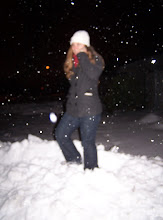On Wednesday, I asked students to take a few moments to free-write what they thought reading and writing meant. I had not originally planned to do this, but I had two new students and thought I should take a couple of minutes to give out course policies, syllabi, etc. It turned out really well. As we discussed definitions of reading, writing, meta-reading, and meta-writing, the free write allowed them to collect their thoughts on the issues at hand. They all had some pretty interesting things to say.
Students' responses to my next question were even more interesting. I asked them if they thought they were readers and writers. Some answered in the affirmative, but most didn't consider themselves to be either. I asked one particular student who looked quite ashamed of himself (I guess because he thought he should be a reader and a writer) why he didn't consider himself a reader. He told me that he didn't really read anything outside of school. As we debated what a reader is, I pointed out that the definition we had come up with in class did not limit reading to simply books or print. The guy perked up and said that he belonged to a "movie group." He and some of his friends get together each week, and watch movies. Then, they sit around and "talk about them." The class determined that since he does read for school, that he does read emails, text messages, and "reads" movies, that he is a reader.
This scenario played out similarly about writers. But as I read the Hesse article, I began to think about myself as both teacher and student. I have always fancied myself a reader, but I began to wonder, do I consider myself a writer? What is a writer? I came to the conclusion that until last semester, I didn't think of myself as a writer, perhaps a writer wannabe. Somewhere in the midst of practicum and meetings with my writing group in the Fall, I became a writer. Therefore, I cannot judge my students for having their own doubts and misconceptions. Instead, I need to be honest with them about my own educational experiences, relate to them because I am still learning too.
Finally, to end my ramblings--that, it seems, don't exactly relate to the Hesse article, but hopefully does show that the article made me think about myself and my students--I turn to the articles the students will be reading related to our course theme. I'm sure that many of them will have some of the same reactions Hesse mentions (the same reactions many of us have had about articles we've read for classes), but I think by examining not only what the articles say, but also how they say it, perhaps we can decenter these knee-jerk responses. I too will need to remember to keep the knee-jerking to a minimum as I re-read some of them, for after all, I'm a lit person, not a biologist.
Tuesday, January 20, 2009
Subscribe to:
Comments (Atom)
